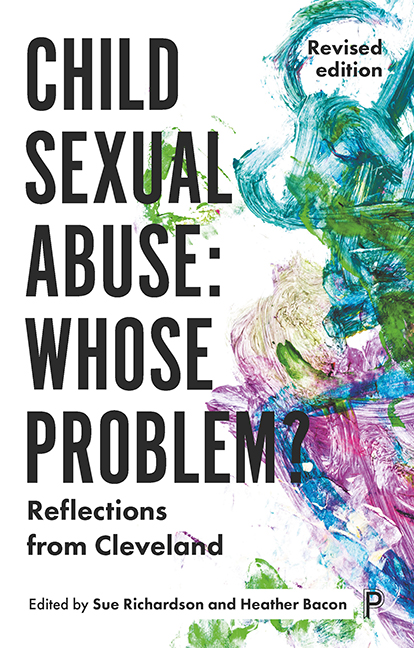Book contents
- Frontmatter
- Dedication
- Contents
- List of tables and figures
- List of abbreviations
- Notes on the editors and contributors
- Acknowledgements
- Preface
- Introduction:Why Cleveland still matters: connections with a new era
- one From Colwell to Cleveland: 1973 to 1988
- two A framework of belief
- three The medical diagnosis of child sexual abuse: the paediatrician’s dilemma
- four After the medical diagnosis: everyone’s dilemma
- five The continuum of disclosure
- six Seen but not heard: the children of Cleveland
- seven The unwanted message: child protection through community awareness
- eight Questions not answers: progressing the debate
- Conclusion:Thirty years later: how far have we progressed?
- Appendix
- References
- Index
four - After the medical diagnosis: everyone’s dilemma
Published online by Cambridge University Press: 13 April 2022
- Frontmatter
- Dedication
- Contents
- List of tables and figures
- List of abbreviations
- Notes on the editors and contributors
- Acknowledgements
- Preface
- Introduction:Why Cleveland still matters: connections with a new era
- one From Colwell to Cleveland: 1973 to 1988
- two A framework of belief
- three The medical diagnosis of child sexual abuse: the paediatrician’s dilemma
- four After the medical diagnosis: everyone’s dilemma
- five The continuum of disclosure
- six Seen but not heard: the children of Cleveland
- seven The unwanted message: child protection through community awareness
- eight Questions not answers: progressing the debate
- Conclusion:Thirty years later: how far have we progressed?
- Appendix
- References
- Index
Summary
Editors’ summary
In this chapter Doctors Higgs and Wyatt extend their consideration of the dilemmas for everyone after medical diagnosis of probable sexual abuse. They provide further data which supported the diagnosis and the initial outcomes for the children in Cleveland. Most such children were admitted to the children's ward at the local hospital after which many were placed with foster parents. The authors examine the desirability, and the drawbacks, of keeping parents fully informed, and the requirement for expert multidisciplinary assessment, which must seek corroboration of the diagnosis and plan appropriate support for all concerned, including the abuser. The case is made for more support to doctors in making this very difficult but important diagnosis.
One point which has not really emerged from the report is that children are now being recognized as probably abused before they ‘have disclosed’ i.e. they are not ready. In the past ‘disclosure’ or an allegation to the police was the usual presentation of child sexual abuse. We know many children never describe their abuse, others only after months in the safety of a foster home. Children left at home may be threatened and never feel able to disclose, and without some sort of admission from them, child professionals are increasingly anxious about taking any action. Yet it may be only by removal of the child from the abuser that the child can develop the confidence to tell. (Wynne, 1988, p. 14)
Introduction
This chapter considers how the medical opinion becomes part of the wider assessment, particularly when the doctor raises the initial concern about sexual abuse. In all aspects of paediatric practice parents are involved because they are responsible for the care of their children. This parental responsibility has to be addressed by the multidisciplinary team in the management of suspected child sexual abuse. A model is suggested for investigation depending on whether the child is in Group A or Group B.
Immediately after the medical diagnosis: the Cleveland experience
Once a medical diagnosis has been made other people need to become involved, since doctors have a duty to report sexual abuse. Guidance for Doctors (DHSS, 1988a) in essence endorses medical practice in Cleveland in 1987.
- Type
- Chapter
- Information
- Child Sexual Abuse: Whose Problem?Reflections from Cleveland (Revised edition), pp. 103 - 118Publisher: Bristol University PressPrint publication year: 2018



